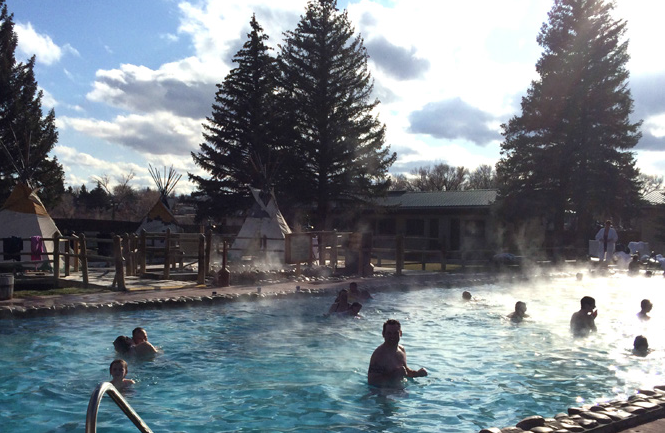
Original “Indian Bath Tubs”, which utilized the mineral hot water, with the town of Saratoga in the background.
Balneotherapy is the treatment of medical conditions by bathing in naturally occurring heated mineral water. It is an ancient practice that has been used throughout history for the treatment of many diseases. Although contemporary medicine has been slow to establish the scientific basis for the benefits of submersion in mineral-rich hot springs water, a long history of use strongly suggests medicinal benefits. It is widely recognized that a tranquil hot springs soak provides relief from the pain of stressed muscles and tired joints. The complex effects of hot springs minerals on the skins glands and blood vessels is the likely explanation for the numerous subtle benefits that are reported by those in tune with the hot springs way of life.
Modern balneotherapy is most often used for muscle and skeletal disorders, including osteoarthritis, joint pain, psoriasis (including associated psoriatic arthritis), and swollen spine. Balneotherapy has also been suggested to improve conditions associated with heart disease, fibromyalgia, chronic fatigue syndrome, depression, insomnia, headache, muscle soreness, injury, low back pain, spinal cord injury, muscle spasms, stroke, acne, dermatitis, eczema, and many other conditions.
 Sulfur: 191 mg/L
Sulfur: 191 mg/L
Skin Disorders
Saratoga natural hot springs contains sulfur at the concentration of 191 mg/L.
Sulfur, at this concentration, has been effective in the treatment of psoriasis,
eczema, dandruff, folliculitis (infected hair follicles), warts, and pityriasis
versicolor, a long-lasting skin disorder characterized by patches of skin that
are a different color from the usual skin tone.
Arthritis
Well-designed studies, most conducted in Israel, suggest that balneotherapy can help treat several different kinds of arthritis, including osteoarthritis (OA), rheumatoid arthritis (RA), and psoriatic arthritis. People who took sulfur baths and other spa therapies improved strength, had less morning stiffness, had better walking ability, and less inflammation, swelling, and pain in joints, particularly in the neck and back. Mud packs and Dead Sea salts dissolved in a regular bath tub also improved symptoms of arthritis, but not as effectively as soaking in the Dead Sea itself.
Sulfur contributes to the formation of the proteins that make up our connective tissues, skin, nails and hair. The pain-relieving properties of sulfur may come from its ability to slow the conduction of pain signals through the nervous system.
Silica: 57 mg/L
Silica has been shown to contribute to certain enzyme activities that are necessary for normal collagen formation. Collagen is the most abundant human protein and is found in skin, ligaments, and tendons. Proper collagen formation is essential for maintaining tight, wrinkle-free skin, so silica can also be beneficial for slowing down the signs of skin aging. Silica is essential for maintaining the health of connective tissues due to its interaction with the formation of glycosaminoglycans which are structural building blocks of these types of tissue. One well-known glycosaminoglycan important for skin health is hyaluronic acid, which has been shown to promote skin cell proliferation and increase the presence of retinoic acid, improving the skin’s hydration.
Silica is believed to restore health to aging skin, hair and nails.
Sulfate: 576 mg/L
Sulfates play an important role in the formation of brain tissue, joint proteins and the proteins that line the walls of the digestive tract. They stimulate the pancreas to generate digestive enzymes and are thought to help detoxify the body of medicines and environmental contaminants.
The Six Essential Minerals That Your Body Needs Every Day
Calcium: 121 mg/L
Calcium, the most abundant mineral in your body, is required for developing and maintaining strong bones and teeth, according to the University of Maryland Medical Center. About 99 percent of the calcium in your body is stored in your bones and teeth. Calcium requires the presence of phosphorus, magnesium (Saratoga concentrations: 8.8 and 0.5 mg/L respectively) and vitamins D and K for adequate absorption. If you have a calcium deficit, it may cause or contribute to conditions such as osteoporosis, hypertension, elevated cholesterol and rickets.
Magnesium: 8.8 mg/L
Magnesium helps build bones, enables proper nerve and muscle function, and is essential to the production of energy from food. Magnesium is also necessary for proper enzymatic function. Magnesium has been shown to have therapeutic value in treating conditions such as headaches, chronic pain, asthma, and sleep disorders. In a recent large scale study, magnesium has been linked to a reduced incidence of conditions such as heart disease, hypertension, and diabetes.
Chloride: 547 mg/L
Chloride is an electrolyte that works with sodium, potassium and carbon dioxide to maintain the acid-base balance in your body and to keep the proper balance of body fluids.
 Phosphorus:~0.5 mg/L
Phosphorus:~0.5 mg/L
Phosphorus, the second most abundant mineral in your body, helps build strong teeth and bones, filters out waste in the kidneys and helps your body store and use energy. Phosphorus plays an active role in tissue and cell growth and repair.
Potassium: 21.8 mg/L
Potassium is active in muscle-nerve communications and in moving nutrients into cells while moving wastes out of the cells.
Sodium: 472 mg/L
Sodium is essential for your body to maintain the proper fluid balance, transmit nerve impulses and assist in muscle contraction and relaxation.






